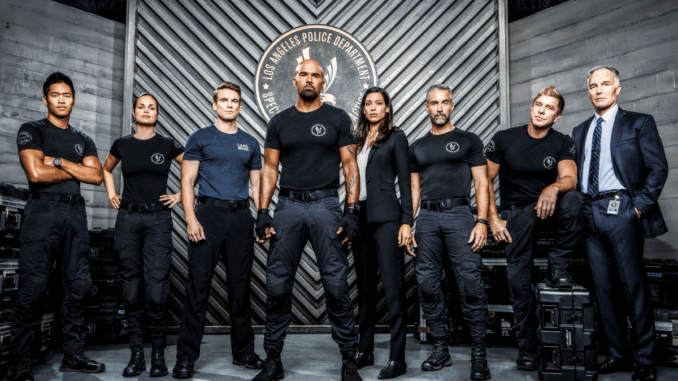
Shemar Moore Speaks Out—And He’s Not Holding Back
Shemar Moore is known for playing tough, bold, and vocal characters—but this time, he’s not acting. Following CBS’s controversial cancellation of S.W.A.T., Moore took to social media and the press to share his outrage—and he didn’t mince words. His message? The network made a mistake, and it’s time to have a real conversation about diversity in television.
A Shocking Announcement From CBS
Fans Were Blindsided
When CBS announced that S.W.A.T. wouldn’t be returning for another season, it hit fans hard. The series, still pulling in strong viewership numbers, wasn’t suffering creatively or commercially. So why pull the plug? That’s exactly what Shemar Moore wanted to know—and he wasn’t shy about saying it out loud.
Moore’s Emotional Reaction: “It’s Bigger Than Me”
A Personal and Cultural Standpoint
Shemar Moore didn’t just see this as a career hit. He saw it as a blow to representation, especially in an industry still struggling to consistently spotlight diverse casts and creators. “We are the most diverse show on CBS,” he said in a passionate Instagram video. “If I post this, I may get in a lot of trouble… but I’m standing in my truth.”
The Importance of ‘S.W.A.T.’ in Today’s TV Landscape
Let’s face it—S.W.A.T. wasn’t just another police drama. It stood out for its racially diverse cast, its willingness to tackle real-world issues like systemic racism, and its commitment to showing the human side of law enforcement. It wasn’t just TV—it was conversation-starting storytelling.
Calling Out the Double Standard in Hollywood
“We’re Good Enough for the Ratings, But Not for Renewal?”
Moore’s point is clear: Why are shows led by diverse actors the first to get cut, even when they succeed? His criticism reflects a larger issue in the entertainment world where representation doesn’t always lead to stability.
A History of ‘S.W.A.T.’ Success
Over its seven-season run, S.W.A.T. earned a loyal fanbase, consistent ratings, and critical praise. It wasn’t just surviving—it was thriving. That’s why CBS’s decision felt more like a business move than a creative one, and Moore wasn’t afraid to challenge it.
Moore’s Message to Fans: “We Did It Together”
In his video, Moore thanked the fans profusely, calling them the reason S.W.A.T. lasted as long as it did. “You rode with us. You believed in us. And you showed up, week after week.” It’s a reminder that audience support truly matters, especially in moments like these.
What This Says About the State of Network Television
Let’s be honest: traditional network TV is shifting. Streaming platforms, changing ad revenues, and new media habits are shaking things up. But the danger is that shows like S.W.A.T., despite doing everything right, still get caught in the crossfire—especially when they’re diverse.
Is This a Setback for On-Screen Diversity?
Moore’s comments ring true for many. “We have Black, White, Latino, Asian, female, strong female leads,” he pointed out. “This show is doing the work.” Canceling S.W.A.T. feels like a step backward at a time when inclusion should be moving forward.
The Fan Reaction: Loud, Loyal, and Not Backing Down
Social media erupted with hashtags like #SaveSWAT and #SWATDeservesBetter. Fans shared stories about how the show impacted them, especially those who rarely see themselves reflected on-screen. The message? “We’re not done yet.”
Could Streaming Come to the Rescue?
Shows like Lucifer, Brooklyn Nine-Nine, and Manifest found second lives on platforms like Netflix. With Moore’s star power and S.W.A.T.’s dedicated base, it’s not crazy to think another network or streamer might step in.
CBS’s Response: So Far, Radio Silence
As of now, CBS has stayed relatively quiet. No major statement has directly addressed Moore’s criticism or the show’s diversity impact. That silence? It’s only making the noise from fans and cast members grow louder.
A Legacy Larger Than One Show
Whether or not S.W.A.T. returns, its impact is clear. It challenged TV norms, gave a platform to underrepresented voices, and proved that diverse storytelling is more than just a checkbox—it’s a powerful way to connect.
Moore’s Final Word: “We Matter Too”
With emotion, fire, and passion, Shemar Moore left us with a message that resonates far beyond one show. “Don’t just use us when it’s convenient. See us. Hear us. Respect us. Because we matter too.”
Conclusion: This Isn’t Just About ‘S.W.A.T.’—It’s About the Bigger Picture
Shemar Moore’s callout of CBS isn’t just a personal grievance—it’s a reflection of a larger issue in entertainment. S.W.A.T. proved that diversity works. It resonates, it sells, it builds community. Canceling it without a clear reason sends a message that a lot of people aren’t okay with. The conversation isn’t over—and with voices like Moore’s leading the charge, it’s only getting started.
FAQs
1. Why did Shemar Moore say CBS made a “mistake” canceling S.W.A.T.?
He believes the show was performing well in both ratings and representation, and its cancellation felt unjustified.
2. What did Moore say about diversity in his response?
He emphasized that S.W.A.T. had one of the most diverse casts on CBS and felt canceling it sends the wrong message about inclusivity.
3. Has CBS responded to Moore’s comments?
As of now, CBS hasn’t made a detailed public response addressing Moore’s criticism.
4. Could another platform save S.W.A.T.?
There’s strong fan momentum, so a streaming rescue is possible if networks or platforms see value in the show’s following.
5. How have fans reacted to the cancellation?
With outrage and support—many are using social media to campaign for the show’s return under the hashtag #SaveSWAT.
Thanks for reading. If you believe in diverse voices and stories that matter, share this article and keep the conversation alive. Your voice could be the one that helps bring S.W.A.T. back. 💪🏾 #WeMatterToo